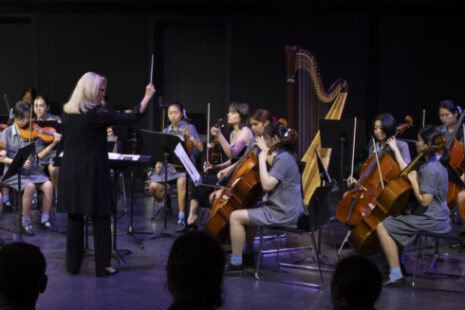Critical Inquiry, Intelligent Learning

At St Catherine’s, every teacher’s primary focus is to deliver the best education for the girls they teach every day. Despite our very high standards of practice, there is a strong belief that we can improve.
Of particular interest, and a growing concern amongst teachers, is that students are too often focused on learning facts to obtain grades. A more sophisticated approach to their learning is required.
The School has commenced a collaborative relationship with the University of Queensland and Peter Ellerton who is a lecturer in critical thinking and the founding director of the University
of Queensland Critical Thinking Project. Peter argues that: “Schools need to better prepare young people for an increasingly complex world. Of paramount importance is the ability to think critically and work with others to approach complex problems in novel ways. These are becoming ever more important for all young people to acquire in order to thrive in a world increasingly
globalised and augmented by technology.
There are, therefore, more frequent calls for students to have stronger capacities in critical and analytical thinking so that they might identify biases in news, data and in their own interpretations, develop deeper understanding of complex ideas and empathy for different perspectives.”
This project aims to improve teacher capacity to teach for thinking, not just for learning. At the heart of the project we are evolving the best ways to develop student understanding by focussing on their thinking. Teachers are concerned about the passivity students can demonstrate in the face of intellectual challenge.
Peter Ellerton has developed a pedagogical schema which is focussed on the content knowledge of intellectual inquiry. Three imperatives or principles of action are to:
- Shift the focus from knowledge to inquiry;
- Think and plan in the language of student cognition; and
- Work collaboratively when thinking can be shared.
The schema outlines a relationship between cognitive skills, intellectual values and intellectual dispositions, which will be the focus of our teaching and learning across the school. Teachers will develop their skills and knowledge in ensuring all classes emphasise three critical aspects of intellectual inquiry.
- COGNITIVE SKILLS such as Evaluating, Analysing, Interpreting, Synthesising and Problem-solving.
- VALUES (provide feedback on the acquisition of the cognitive skills) such as Clarity, Precision, Accuracy, Coherence and Tolerance of ambiguity.
- DISPOSITIONS (habits that come from mastery of the values) such as Independence, Persistence, Resilience, Integrity, Curiosity, Empathy and Global responsiveness.
We aim to grow our learning culture at St Catherine’s so that teachers and students have common language, common understanding and common approaches to high quality intellectual
endeavour.
John Dewey the prominent educational reformer in the first half of the twentieth century, whose ideas have been influential in education and social reform commented that “Thinking
is the method of intelligent learning”. Our goal is to make sure intelligent learning is in every classroom, every day.




